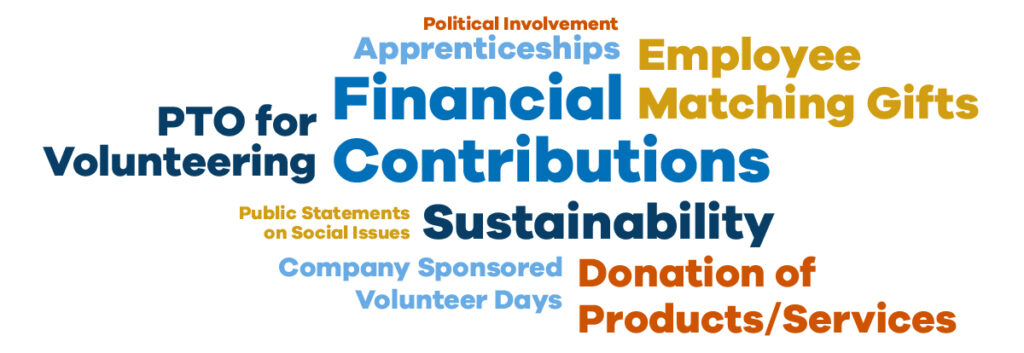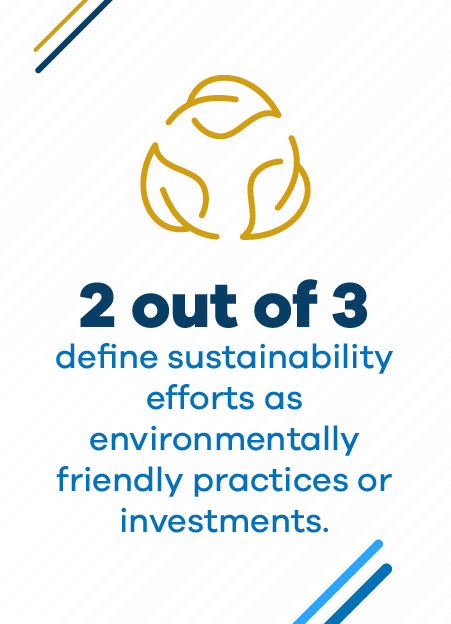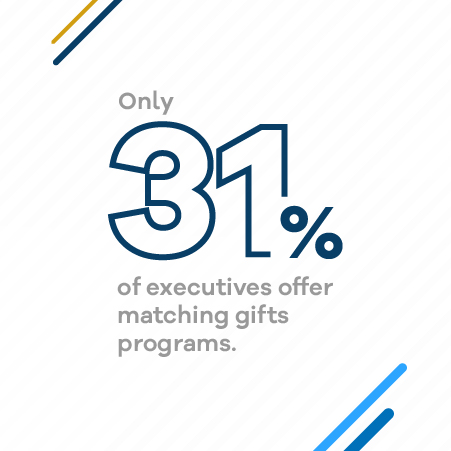2023 BUSINESS GENEROSITY REPORT:
Employees Ask For Community Outreach Reboot
Do Historic Community Programs Need a Reboot?
Companies have long understood the positive benefits of a well-thought-out community engagement program. In this year’s survey, Georgia employees clearly indicated their shifting priorities regarding the most important demonstrations of generosity to the community.

When asked to select their top two most important demonstrations of generosity to communities from a comprehensive list, financial contributions continues to come in first. This year, matching gifts and sustainability efforts tied for a close second. Traditional favorites such as company-sponsored volunteer events continue to decline in employee interest, with a rising preference for PTO for volunteering.
What Do Employees Mean by Sustainability Efforts?

goBeyondProfit partnered with Qualtrics as part of an omnibus survey in an effort to help executives understand what employees specifically mean by sustainability efforts.
The majority of people (61%) define sustainability efforts as some level of “green” business practices, such as either offering environmentally friendly programs at the office (38%) or investments in renewable energy or environmental projects (23%).
However, 37% of people simply define sustainability efforts as a business taking care of customers and employees over the long term. This broader definition highlights the increased importance of integrating generosity throughout the full scope of business to ensure the long-term well-being of all stakeholders.
Currently, two out of three (68%) executives say they engage in sustainability efforts, leaving a clear opportunity for the remaining 32% to demonstrate generosity by either initiating or communicating sustainability efforts.
Missed Opportunity to Partner on Employee Giving
Employee matching gift programs remain a top selection, with 77% of employees asserting that offering matching gifts is very or somewhat important. While 31% of executives plan to maintain or increase their matching gift program this year, a full 67% of executives say they do not currently offer a matching gifts program.
Employee matching gift programs are an easy and often low-cost way for companies to provide additional benefits their employees want while partnering with them in demonstrating generosity to communities.

Employees Seek Autonomy in How They Volunteer
As employees continue to desire flexibility and autonomy in how they spend their time, PTO for volunteering comes in fourth as a demonstration of generosity. Meanwhile, company-sponsored volunteer events dropped to the bottom three, a consistent trend since 2021.
Notably, while employee interest in participating in company-sponsored volunteer events has declined for several years, executives continue to prioritize them in their budgets, with 76% of executives saying they offer this benefit and a full 25% of executives intending to increase their investment this year.
Additionally, 78% of employees say they prefer PTO to volunteer when and where they want; however, nearly half (48%) of executives say they don’t currently offer this option.
For your Gen-Z employees (ages 18-24), company volunteerism is especially uninteresting (only 15% place it in their top two); however, one in four employees who arrived at the company in the last six months highly value company-sponsored volunteer events.
The Tightrope of Public Statements and Politics
In our 2021 survey, 91% of employed adults in Georgia said they expected their CEO to express a point of view about sensitive social issues. In this year’s survey, 63% of employed adults selected public statements on social issues as a somewhat or very important demonstration of generosity. While this represents a notable decline in employee sentiment, most employees continue to view public statements as important.

In the current political climate, more than half (54%) of employee respondents named employer political involvement as not very to not at all important. Balancing the distinction between employees desire for public statements on social issues and the lack of employee support for political involvement will continue to be a challenge for executives.
Explore further insights:
In Partnership with





